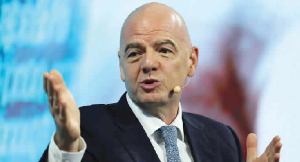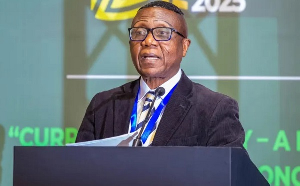By Otchere Darko
The way we pursue politics in Ghana follows the crude political principle that says: “reward your followers and victimise followers of your opponents”. At the top, the pursuit of this principle by governing parties in Ghana creates the culture of cronyism, nepotism, tribalism, brain stagnation and brain drain, apart from encouraging and requiring the unnecessary dismissal of people in opposition and creating social distress and disunity. At the bottom, the pursuit of the principle by party followers encourages them to expect and constantly demand never-ending favours from governments that they help to put in place. The constant hailing of accusations at President Mills in his first eighteen months in government by disappointed NDC youth who claimed that the President had failed to fulfil election promises [of rewards] he made to them, [the youth], clearly shows the dilemma created in Ghanaian politics by the principle.
Dr Kwesi Botchwey, a former lecturer of University of Ghana, who during those days constantly used students’ lecture hours to criticise the Busia administration for cronyism and favouritism and who later joined the PNDC and was twice the Finance Minister for former President Rawlings’ PNDC and NDC governments, is reported to have said at a special congregation to climax this year’s Kwame Nkrumah Memorial lectures at the University of Cape Coast that *“we can reward followers of our parties without necessarily crushing [our] opponents.” *Nicely articulated! But can we “reward our followers” without “crushing [our] opponents”, from economics point of view? And secondly and most importantly, do we really have to “reward followers of our parties” at the expense of the State, if even economic strength allows it?
If we do have to, then, is there nothing morally wrong with our political thinking? Put less tentatively, one may say that if this practice that has now gained currency is validated, then we are encouraging political bribery and corruption (1): by politicians soliciting support with the promise to reward; and (2): by party followers offering support in exchange for reward........two acts that contradict the principles of “good governance”. In my view, parties do not have to, and should not reward their followers at the expense of the State.
In arguing that parties should not “reward their followers”, I am not saying that parties should not appoint their members to positions in government when they win elections. They, in fact, have to fill political positions by appointing members of their parties into such positions for reasons of trust. No realistic person expects a party that wins general elections to appoint members in opposition to fill political posts, since doing that would generate internal friction and lead to possible political suicide for the party concerned. But filling political positions with party followers should not be seen as “rewarding followers”. Instead, it should be seen as a duty that parties have to fulfil as part of the process of governance. This requires that, in filling political positions, parties have to choose those members of their parties who are “fit for the positions” and not members who need to be rewarded for special contributions they make to their party’s coffers or towards their party’s electoral victories. If parties want to reward “dutiful” and “loyal” party followers with resources from party coffers, or with positions within their parties, that should be their own business. On the other hand, “rewarding party followers” with what belongs to the State is an act of “stealing from the State” and this should not be entertained. Parties should, therefore, stop promising their followers with what belongs to the State. What NDC youth have been doing to President Mills because of what they, the NDC youth, say is the failure of the President to fulfil his promises to them is a demonstration of the mistake that parties make by promising followers with rewards that belong to the State and over which governing parties have no absolute control.
I do believe that one way for parties in poor countries like Ghana to get out of the quagmire of promising “reward to their followers” at the expense of the State is by splitting party followers into two: that is, into “party members” and “party supporters”; and then limiting membership of parties to only those who intend to vie for political positions within their parties and within governments when their parties win elections; while treating “party supporters” as people who can be relied upon to win elections, but who have no political ambitions, who are not members of the party as such, and who should not pay party dues or make personal sacrifices, other than doing so voluntarily. “Party members” should be expected to contribute to their party’s political agenda to win elections through individual and collective efforts as a means towards the fulfilment of their own individual political ambitions. When their parties become victorious, such party members move towards the “fulfilment of their individual political ambitions”. This should not be seen as “rewards” for helping their parties to win elections. Accordingly, “party members”, who should all have political ambitions, should be the party’s only dues payers; they should be the only people who qualify to attend party meetings; they should be the only people who qualify to select party officials and candidates; and they should also be the only people who qualify to stand for positions within their parties as party executives and within the nation as their party’s candidates. In effect, what party members do in their parties should not need to be “rewarded” since metaphorically “they cook their own food to eat”. People who cook their own food to eat are not rewarded for their efforts.
“Party supporters”, on the other hand, should be seen as: people who have officially identified themselves with parties concerned and want such parties to win future elections because they trust them to govern well; people who have no political ambitions of their own; and people who, therefore, NEED NOT make any financial and personal sacrifices to the parties they support. This requires that “party supporters” who do specific work for parties should be paid by them from party coffers as workers for these parties, instead of being promised for future “rewards” at the expense of the State. “Party supporters” who choose to work free of charge for the parties they support should do that out of their own volition, and should not in return demand or expect future “reward” at State expense.
My idea of creating “two groups of party followers” made up of “party members” and “party supporters” may sound utopian, given what Ghanaians are used to. I understand this scepticism, even though I do not accept it. I strongly feel that party followers cannot continue to “screw rewards” from parties and politicians and expect that their behaviour will not be seen to constitute “bribery and corruption”, on their part as party followers, and “a disincentive to the duty of providing clean government”, on the part of their parties. Besides the two arguments above involving “bribery and corruption” and “disincentive to clean government”, every time parties “reward their followers”, they are COMPELLED to “victimise followers of their opponents”, through what then becomes “robbing Peter to pay Paul”, by an economic situation of “SCARCITY OF MEANS”, in which there cannot be “enough” to go round “followers” of the governing party and those of the opposition parties...... an economic reality which, in my view, contrasts with Dr Kwesi Botchwey’s argument that governments can reward “party followers” without “crushing [their] opponents”.
One more thing that needs doing, in addition to the proposition of splitting party followers into “members” and “supporters”, is that we should use the law to severely cut down on the cost of doing politics in Ghana to enable as many honest but thinly-resourced politicians as possible to go into politics and, also, to make it unnecessary for parties to solicit financial support from outside party membership. I find it hard to understand why a poor country like Ghana should always try to copy the way politics is done in rich countries like America. Can’t we find ways to make our primaries simpler and cheaper? Do we have to mount huge billboards across our roads from Accra to Zuarungu in a country where more than 70% of the electorate do not understand the messages on these billboards? Do we have to involve poor young people in election campaigns on promises in a country that has just come out of the description of being “heavily indebted” and pardoned from paying substantial parts of its old debts and yet cannot develop without chasing new loans from capitalist Korea to communist China? Will it not be better and more rewarding for parties to introduce themselves and their political aspirants to the electorate by interacting with communities through participation in community development projects, instead of wasting moneys on expensive adverts and propaganda materials that technically have little impact in a third-world country like Ghana where people care more about reality and not rhetoric? These are just a few of the questions we need to answer, if we want to confront the causes of political corruption in Ghana.
We, in fact, have created the grounds for political corruption through the way we run parties and the way we do politics. What I am hoping for is that this article will impel readers to come out with better, or other suggestions that will help parties to put an end to the way we do and fund politics, with particular reference to the culture of demanding rewards by, and promising rewards to party followers including party funders and party activists.
Source: Otchere Darko. [This writer is a centrist, semi-liberalist, pragmatist, an advocate for “inter-ethnic cooperation and unity” and a community-based development protagonist. He opposes the negative, corrupt and domineering politics of NDC and NPP and actively campaigns for the development and strengthening of “Third Parties” in Ghana.]
Opinions of Saturday, 2 October 2010
Columnist: Otchere Darko














